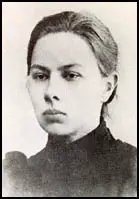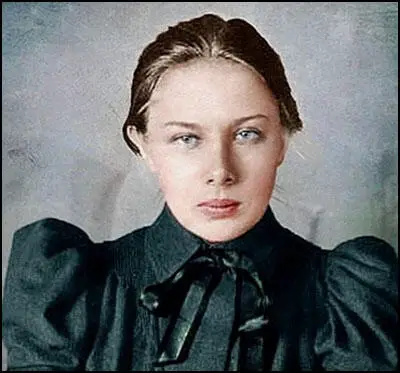Nadezhda Krupskaya

Nadezhda Krupskaya, the daughter of a military officer, was born in St. Petersburg on 26th February, 1869. A radical from an early age, Krupskaya was a committed Marxist and was the member of several illegal organizations.
Krupskaya taught in an evening school for adults and in 1894 met fellow revolutionary, Lenin. Two years later Lenin was arrested and sentenced to three years internal exile in Siberia. Krupskaya joined Lenin in Shushenskoye and they married in July, 1898. While living in exile Lenin and Krupskaya also translated from English to Russian, The Theory and Practice of Trade Unionism by Sidney Webb and Beatrice Webb.
Released in February, 1900, Krupskaya, Lenin and Jules Martov decided to leave Russia. They moved to Geneva where they joined up with George Plekhanov, Pavel Axelrod and other members of the Liberation of Labour to publish Iskra (Spark). The paper was named after a passage from a poem: "The spark will kindle a flame". Others who joined the venture included Gregory Zinoviev, Leon Trotsky and Vera Zasulich. Another revolutionary, Clara Zetkin, arranged for Iskra to be printed in Leipzig, Germany.
At the Second Congress of the Social Democratic Labour Party in London in 1903, there was a dispute between Lenin and Julius Martov. Lenin argued for a small party of professional revolutionaries with a large fringe of non-party sympathizers and supporters. Martov disagreed believing it was better to have a large party of activists. Martov won the vote 28-23 but Lenin was unwilling to accept the result and formed a faction known as the Bolsheviks. Those who remained loyal to Martov became known as Mensheviks.

Those who joined the Bolsheviks included Krupskaya, Gregory Zinoviev, Joseph Stalin, Anatoli Lunacharsky, Mikhail Lashevich, Alexei Rykov, Yakov Sverdlov, Mikhail Frunze, Maxim Litvinov, Vladimir Antonov, Felix Dzerzhinsky, Gregory Ordzhonikidze, and Alexander Bogdanov.
During the First World War Krupskaya and Vladimir Lenin lived in Switzerland. After the overthrow of Nicholas II in April, 1917, they returned to Russia. Lenin now joined with Leon Trotsky in plotting against the government being led by Alexander Kerensky. When the Provisional Government collapsed in October, Lenin and the Bolsheviks took control of Russia.
Krupskaya had opposed Lenin's calls for an early revolution but after its success she hid her political differences with her husband. In November, 1917, Krupskaya was appointed to serve under Anatoli Lunacharsky as Deputy People's Commissar of Education and Enlightenment.
Lenin's health declined after being shot by Dora Kaplan on 30th August, 1918. Two bullets entered his body and it was too dangerous to remove them. Lenin suffered a stroke in May, 1922 and a second one in December, 1922. Four days later he dictated his famous 'testament' where he assessed all the main party leaders.
Three days after writing this testament Lenin had a third stroke. Lenin was no longer able to speak or write and although he lived for another ten months, he ceased to exist as a power within the Soviet Union. Lenin died of a heart attack on 21st January, 1924. Stalin reacted to the news by announcing that Lenin was to be embalmed and put on permanent display in a mausoleum to be erected on Red Square. Nadezhda Krupskaya, immediately objected because she disliked the "quasi-religious" implications of this decision. Despite these objections, Stalin carried on with the arrangements. "Lenin, who detested hero worship and fought religion as an opiate for the people, who canonized in the interest of Soviet politics and his writings were given the character of Holy Writ."
The funeral took place on 27th January, and Stalin was a pallbearer with Lev Kamenev, Gregory Zinoviev, Nickolai Bukharin, Vyacheslav Molotov, Felix Dzerzhinsky, Alexander Schottmann and Maihail Tomsky. Stalin gave a speech which ended with the words: "Leaving us, comrade Lenin left us a legacy of fidelity to the principles of the Communist International. We swear to you, comrade Lenin, that we will not spare our own lives in strengthening and broadening the union of labouring people of the whole world - the Communist International." As Robert Service has pointed out: "Christianity had to give way to communism and Lenin was to be presented to society as the new Jesus Christ."
It was assumed that Leon Trotsky would replace Lenin as leader when he died. To stop this happening Joseph Stalin established a close political relationship with Gregory Zinoviev and Lev Kamenev. The three men became known as the "triumvirate". The historian, Isaac Deutscher, the author of Stalin (1949) has pointed out: "What made for the solidarity of the three men was their determination to prevent Trotsky from succeeding to the leadership of the party. Separately, neither could measure up to Trotsky. Jointly, they represented a powerful combination of talent and influence. Zinoviev was the politician, the orator, the demagogue with popular appeal. Kamenev was the strategist of the group, its solid brain, trained in matters of doctrine, which were to play a paramount part in the contest for power. Stalin was the tactician of the triumvirate and its organizing force. Between them, the three men virtually controlled the whole party and, through it, the Government."
Stalin tried to give the impression he was an advocate of the middle-course. In reality, he was supporting those on the right. In October, 1925, the leaders of the left in the Communist Party submitted to the Central Committee a memorandum in which they asked for a free debate on all controversial issues. This was signed by Nadezhda Krupskaya, Gregory Zinoviev, Lev Kamenev and Grigori Sokolnikov, the Commissar of Finance. Stalin rejected this idea and continued to have complete control over government policy.
Nadezhda Krupskaya published her memoirs, Reminisces on Lenin in 1926. She also protested against the arrest of friends such as Osip Piatnitsky He remained in jail for a year before finally being given a summary trial and sentenced to death and executed in October, 1938.
Nadezhda Krupskaya died on 27th February, 1939.
Primary Sources
(1) Nadezhda Krupskaya later described to a friend her time with Lenin in Siberia.
We were young then, we had just got married, we loved each other passionately. For a time nothing else existed for us. And he would have us doing nothing but translating the Webbs.
(2) Lydia Dan, the sister of Jules Martov and the wife of Fedor Dan, was in Munich with Nadezhda Krupskaya and Lenin in 1901.
On Sundays w e usually had lunch together in some large beer hall, where Lenin very attentively examined the menu and selected a good portion of meat, such as he probably never got at home during the week for Krupskaya was not much of a cook. He drank beer with pleasure, teasing me because I drank mineral water rather than beer in Munich. Finally, he would declare that he was at our disposal and was ready, if it pleased us, to go for a walk. However, he never forgot to make it a condition - one which we accepted with varying degrees of pleasure - that we should not discuss politics.
Lenin did not like talking while he walked; he walked to relax; he may have given himself up to contemplating the landscape; but he was invariably in a good mood. In those days, like all of us, he loved to sing. But none of us had good voices.
(3) Nadezhda Krupskaya and Lenin went to live in London in April, 1902. Krupskaya wrote about this in her book, Reminisces on Lenin (1926)
Lenin liked the bustle of this huge commercial city. The quiet squares, the detached houses, with their separate entrances and shining windows adorned with greenery, the drives frequented only by highly polished broughams, were much in evidence, but tucked away nearby, the mean little streets, inhabited by the London working people, where lines with washing hung across the street, and pale children played in the gutter - these sites could not be seen from the bus top. In such districts we went on foot, and observing these glaring contrasts of wealth and poverty, Ilyich would mutter between clenched teeth, in English! "Two nations!"
(4) Maxim Gorky, letter to Romain Rolland (November , 1922)
The fact is that Lenin's wife is by nature not a very bright person, suffering from Basedov disease, and is therefore psychologically not very sound. She compiled a list of allegedly counter-revolutionary works and ordered these to be removed from libraries. The old woman considered works of western European philosophers, thinkers, writers as well as Russian as counterrevolutionary My first thought was to renounce my Soviet citizenship but then, it would not have changed much.

